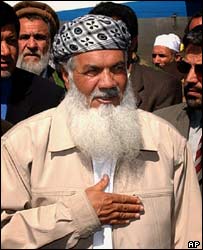Ismail Khan is known as a self-styled emir of western Afghanistan and has become one of the country's most powerful men.

Ismail Khan became one of the most powerful men in Afghanistan
|
Until sacked by President Hamid Karzai he governed Herat, a city unlike any other in Afghanistan.
In Herat, correspondents say, the streets are clean and orderly, and there are traffic lights that drivers actually obey.
During Mr Khan's rule the city flourished, and Herati women are among the country's most educated.
In the evenings residents are able wander freely and safely in tree-filled parks but the removal of Mr Khan and installation of a replacement brought riots on the streets of Herat in which several people were killed.
Mr Khan has such standing in Herat that Mr Karzai went back to him to ask him to make an appeal for calm.
Correspondents say that, for Mr Karzai, Mr Khan is a symbol of the lack of control exerted by the government in western Afghanistan.
Many analysts argue that since the fall of the Taleban, Herat has been Mr Khan's personal fiefdom.
 |
 Ismail Khan was very tough in
terms of social freedoms... but he has done some good works here and
people appreciate that
Ismail Khan was very tough in
terms of social freedoms... but he has done some good works here and
people appreciate that

|
He raised millions of dollars from customs revenues on goods passing to and from neighbouring Iran and Turkmenistan.
But he was accused of failing to pass on the taxes to the government in Kabul.
Human rights groups complain that the veteran warlord has a personal army that patrols the streets.
Despite Herat's many educated women, they say, the city remains conservative even by Afghan standards.
Mujahideen commander
Mr Khan commands a strong following amongst ethnic Tajiks.
He was an officer in the national army and began fighting Soviet forces stationed in Herat just months after their arrival in 1979.
He became a mujahideen commander and fought the Soviets until their withdrawal a decade later.
Eventually, he took control of Herat, where he ruled until imprisoned by the Taleban when they swept to power in 1995.
His escape from his captors in March 2000 allowed him to join the Northern Alliance and fight to end five years of strict Taleban rule in Afghanistan, earning him the gratitude of Herat's population.
His face appears on posters all over the city - part of a personality cult he created around himself.
When Mr Karzai's new governor, Mohammed Khair Khuwa, was installed, he gave his speech in front of a portrait of Mr Khan.
The ceremony took place at the ornately decorated hall where Mr Khan used to receive petitions from poor local residents for help and assistance.
Role in future
The people of Herat had mixed reactions to the dismissal of their governor.
"We wanted a change because Ismail Khan was very tough in
terms of social freedoms," a street hawker called Assadullah told the Reuters news agency.
"But he has done some good works here and
people appreciate that, there is no doubt."
Mr Khan's removal is part of Mr Karzai's effort to rein in Afghanistan's warlords.
The president made a conciliatory gesture, offering Mr Khan a post in his cabinet.
But with his refusal of that offer, it is not clear what role Mr Khan will play in the country's future.

